Marriott Hotel: Talent Management for Culture Change in Business
VerifiedAdded on 2023/01/13
|8
|1108
|76
Report
AI Summary
This report investigates the effectiveness of talent management as a catalyst for culture change within the hospitality industry, specifically using the Marriott hotel as a case study. The research outlines the rationale, aims, objectives, and research questions, including an examination of talent management's impact on organizational culture, ways to improve culture change, and challenges faced. The report employs an interpretivism research philosophy and utilizes a combination of primary and secondary data collection methods, including questionnaires and literature reviews. A probability sampling technique is employed, with a sample size of 40 employees. The timescale, literature review, and research methodology are thoroughly detailed, providing a comprehensive analysis of the topic. The report concludes with a list of references, including books and journals that support the research.
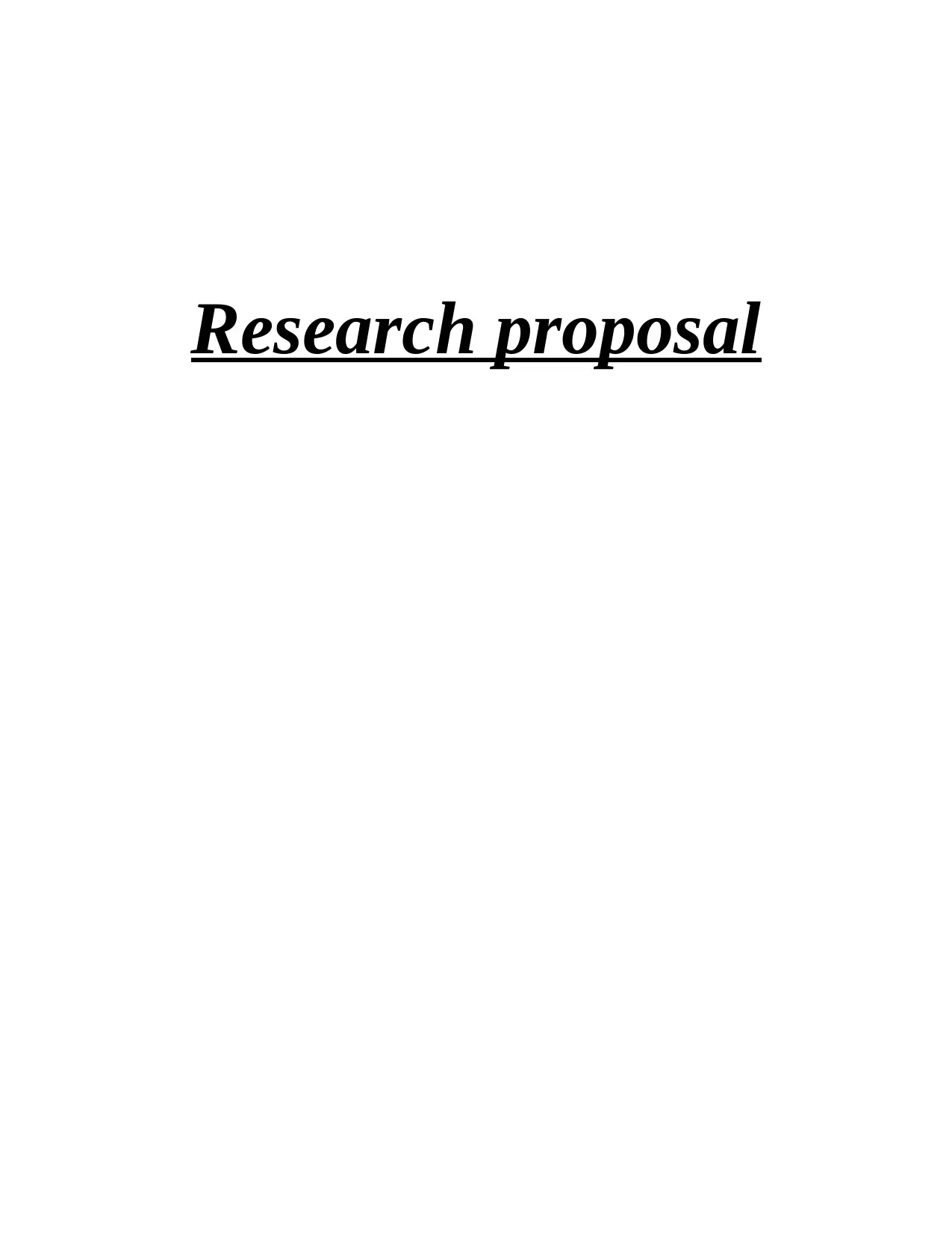
Research proposal
Paraphrase This Document
Need a fresh take? Get an instant paraphrase of this document with our AI Paraphraser
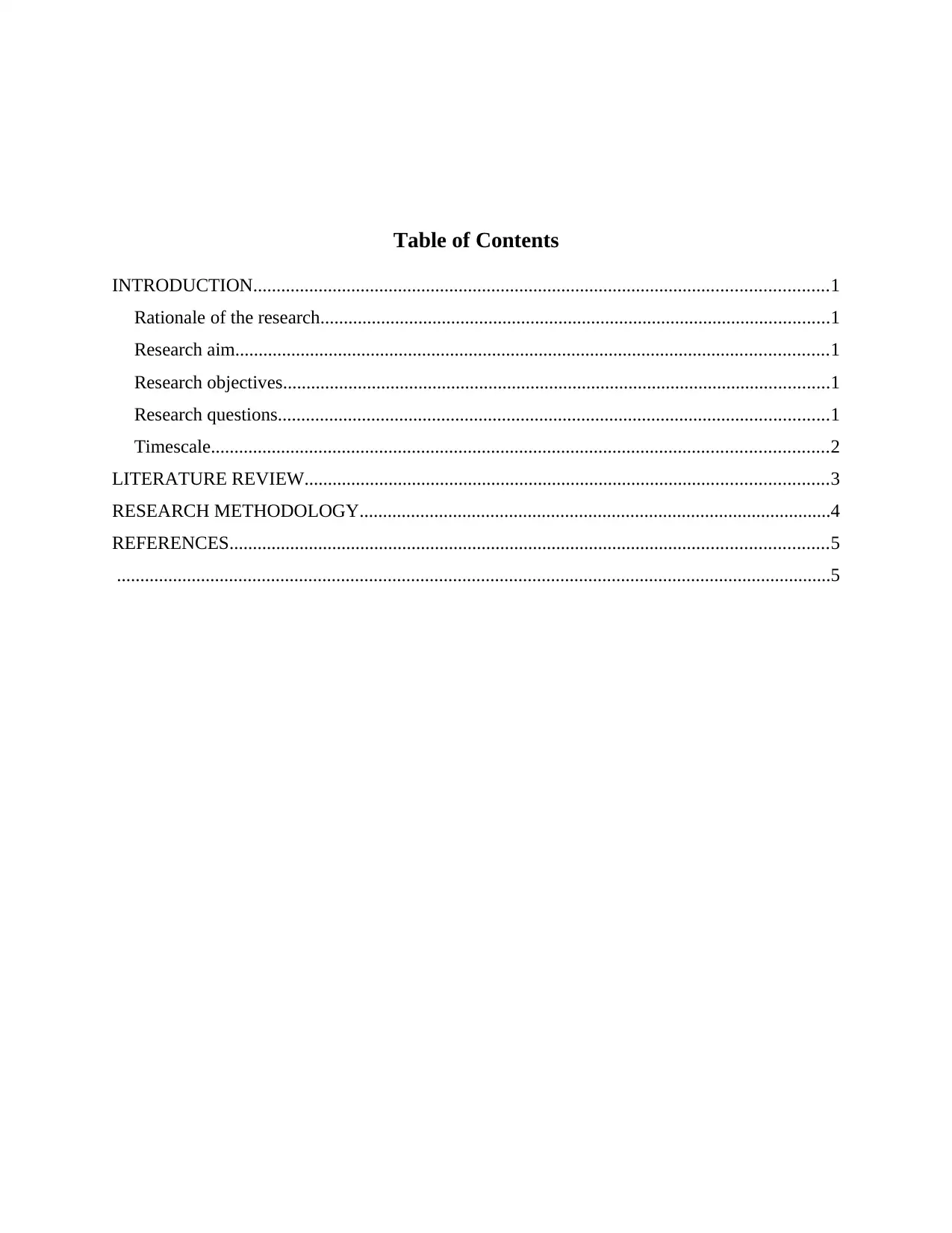
Table of Contents
INTRODUCTION...........................................................................................................................1
Rationale of the research.............................................................................................................1
Research aim...............................................................................................................................1
Research objectives.....................................................................................................................1
Research questions......................................................................................................................1
Timescale....................................................................................................................................2
LITERATURE REVIEW................................................................................................................3
RESEARCH METHODOLOGY.....................................................................................................4
REFERENCES................................................................................................................................5
.........................................................................................................................................................5
INTRODUCTION...........................................................................................................................1
Rationale of the research.............................................................................................................1
Research aim...............................................................................................................................1
Research objectives.....................................................................................................................1
Research questions......................................................................................................................1
Timescale....................................................................................................................................2
LITERATURE REVIEW................................................................................................................3
RESEARCH METHODOLOGY.....................................................................................................4
REFERENCES................................................................................................................................5
.........................................................................................................................................................5

⊘ This is a preview!⊘
Do you want full access?
Subscribe today to unlock all pages.

Trusted by 1+ million students worldwide
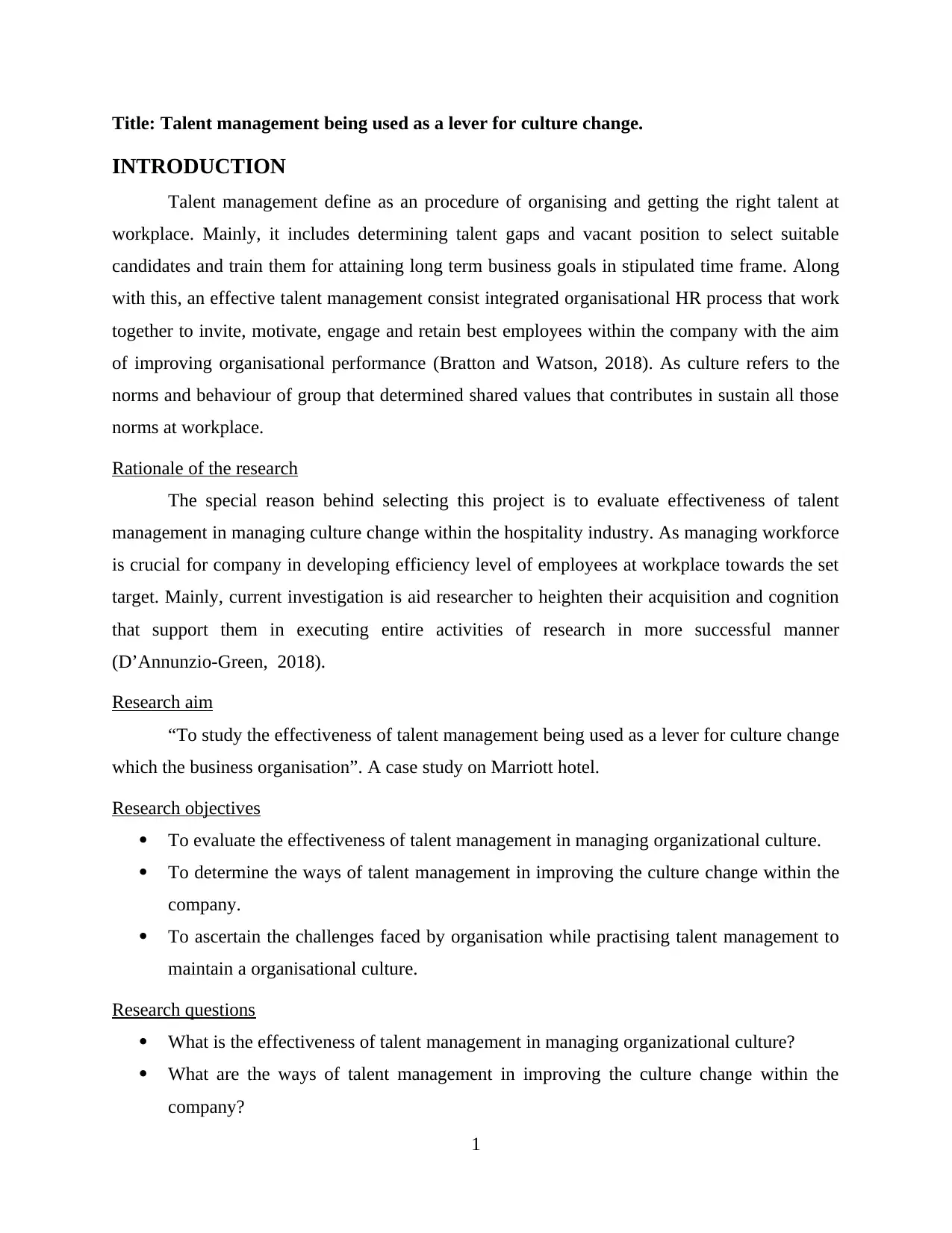
Title: Talent management being used as a lever for culture change.
INTRODUCTION
Talent management define as an procedure of organising and getting the right talent at
workplace. Mainly, it includes determining talent gaps and vacant position to select suitable
candidates and train them for attaining long term business goals in stipulated time frame. Along
with this, an effective talent management consist integrated organisational HR process that work
together to invite, motivate, engage and retain best employees within the company with the aim
of improving organisational performance (Bratton and Watson, 2018). As culture refers to the
norms and behaviour of group that determined shared values that contributes in sustain all those
norms at workplace.
Rationale of the research
The special reason behind selecting this project is to evaluate effectiveness of talent
management in managing culture change within the hospitality industry. As managing workforce
is crucial for company in developing efficiency level of employees at workplace towards the set
target. Mainly, current investigation is aid researcher to heighten their acquisition and cognition
that support them in executing entire activities of research in more successful manner
(D’Annunzio-Green, 2018).
Research aim
“To study the effectiveness of talent management being used as a lever for culture change
which the business organisation”. A case study on Marriott hotel.
Research objectives
To evaluate the effectiveness of talent management in managing organizational culture.
To determine the ways of talent management in improving the culture change within the
company.
To ascertain the challenges faced by organisation while practising talent management to
maintain a organisational culture.
Research questions
What is the effectiveness of talent management in managing organizational culture?
What are the ways of talent management in improving the culture change within the
company?
1
INTRODUCTION
Talent management define as an procedure of organising and getting the right talent at
workplace. Mainly, it includes determining talent gaps and vacant position to select suitable
candidates and train them for attaining long term business goals in stipulated time frame. Along
with this, an effective talent management consist integrated organisational HR process that work
together to invite, motivate, engage and retain best employees within the company with the aim
of improving organisational performance (Bratton and Watson, 2018). As culture refers to the
norms and behaviour of group that determined shared values that contributes in sustain all those
norms at workplace.
Rationale of the research
The special reason behind selecting this project is to evaluate effectiveness of talent
management in managing culture change within the hospitality industry. As managing workforce
is crucial for company in developing efficiency level of employees at workplace towards the set
target. Mainly, current investigation is aid researcher to heighten their acquisition and cognition
that support them in executing entire activities of research in more successful manner
(D’Annunzio-Green, 2018).
Research aim
“To study the effectiveness of talent management being used as a lever for culture change
which the business organisation”. A case study on Marriott hotel.
Research objectives
To evaluate the effectiveness of talent management in managing organizational culture.
To determine the ways of talent management in improving the culture change within the
company.
To ascertain the challenges faced by organisation while practising talent management to
maintain a organisational culture.
Research questions
What is the effectiveness of talent management in managing organizational culture?
What are the ways of talent management in improving the culture change within the
company?
1
Paraphrase This Document
Need a fresh take? Get an instant paraphrase of this document with our AI Paraphraser
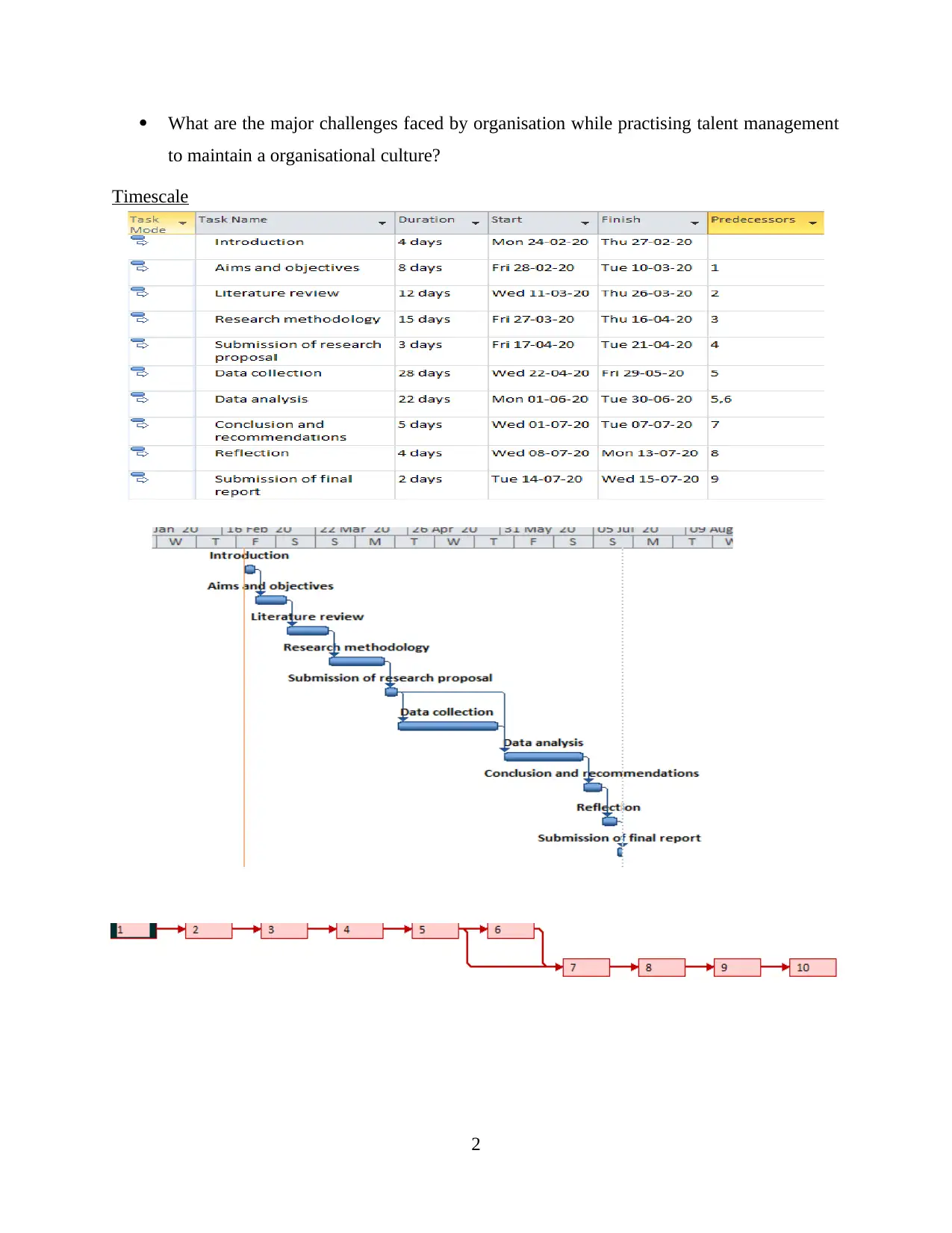
What are the major challenges faced by organisation while practising talent management
to maintain a organisational culture?
Timescale
2
to maintain a organisational culture?
Timescale
2
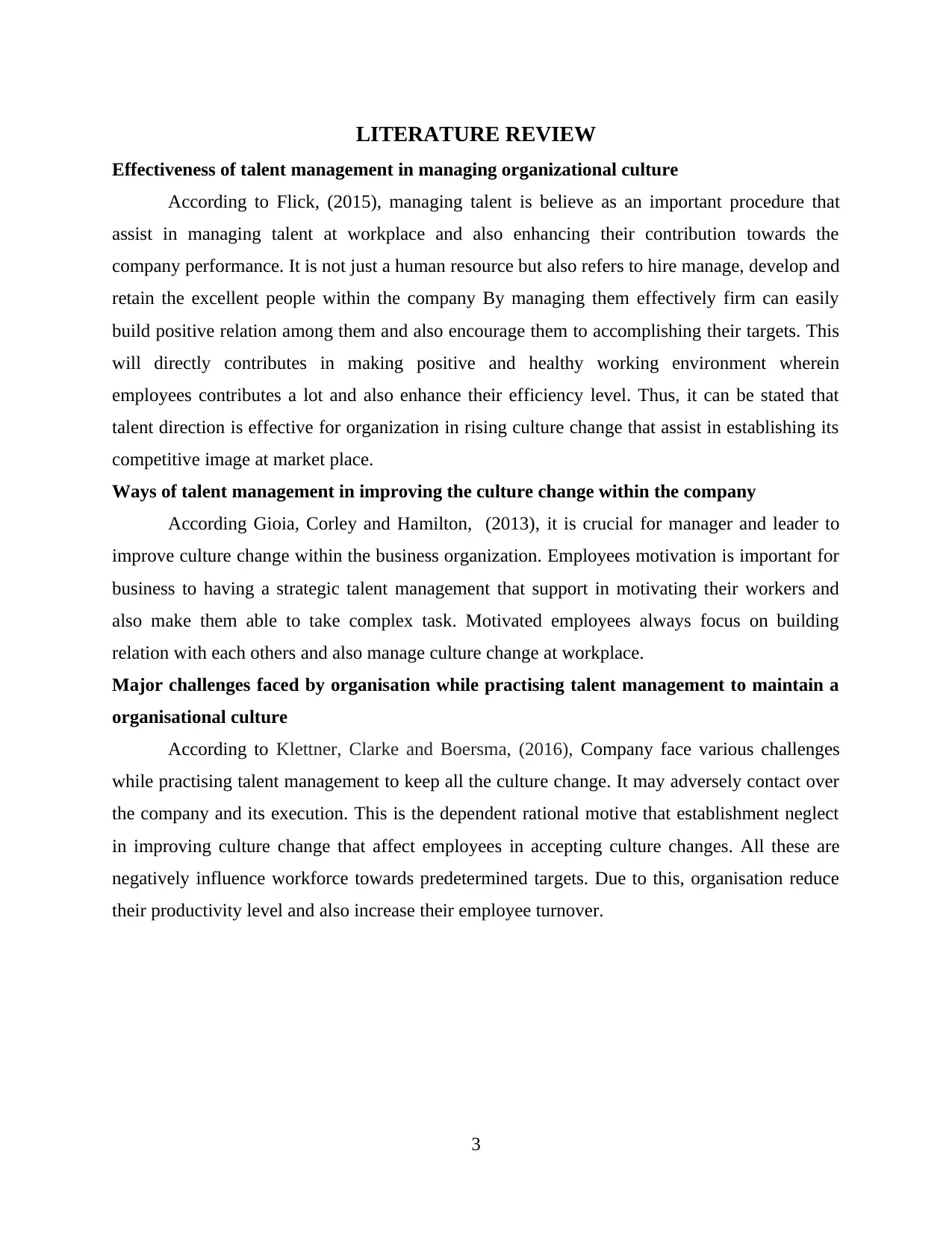
LITERATURE REVIEW
Effectiveness of talent management in managing organizational culture
According to Flick, (2015), managing talent is believe as an important procedure that
assist in managing talent at workplace and also enhancing their contribution towards the
company performance. It is not just a human resource but also refers to hire manage, develop and
retain the excellent people within the company By managing them effectively firm can easily
build positive relation among them and also encourage them to accomplishing their targets. This
will directly contributes in making positive and healthy working environment wherein
employees contributes a lot and also enhance their efficiency level. Thus, it can be stated that
talent direction is effective for organization in rising culture change that assist in establishing its
competitive image at market place.
Ways of talent management in improving the culture change within the company
According Gioia, Corley and Hamilton, (2013), it is crucial for manager and leader to
improve culture change within the business organization. Employees motivation is important for
business to having a strategic talent management that support in motivating their workers and
also make them able to take complex task. Motivated employees always focus on building
relation with each others and also manage culture change at workplace.
Major challenges faced by organisation while practising talent management to maintain a
organisational culture
According to Klettner, Clarke and Boersma, (2016), Company face various challenges
while practising talent management to keep all the culture change. It may adversely contact over
the company and its execution. This is the dependent rational motive that establishment neglect
in improving culture change that affect employees in accepting culture changes. All these are
negatively influence workforce towards predetermined targets. Due to this, organisation reduce
their productivity level and also increase their employee turnover.
3
Effectiveness of talent management in managing organizational culture
According to Flick, (2015), managing talent is believe as an important procedure that
assist in managing talent at workplace and also enhancing their contribution towards the
company performance. It is not just a human resource but also refers to hire manage, develop and
retain the excellent people within the company By managing them effectively firm can easily
build positive relation among them and also encourage them to accomplishing their targets. This
will directly contributes in making positive and healthy working environment wherein
employees contributes a lot and also enhance their efficiency level. Thus, it can be stated that
talent direction is effective for organization in rising culture change that assist in establishing its
competitive image at market place.
Ways of talent management in improving the culture change within the company
According Gioia, Corley and Hamilton, (2013), it is crucial for manager and leader to
improve culture change within the business organization. Employees motivation is important for
business to having a strategic talent management that support in motivating their workers and
also make them able to take complex task. Motivated employees always focus on building
relation with each others and also manage culture change at workplace.
Major challenges faced by organisation while practising talent management to maintain a
organisational culture
According to Klettner, Clarke and Boersma, (2016), Company face various challenges
while practising talent management to keep all the culture change. It may adversely contact over
the company and its execution. This is the dependent rational motive that establishment neglect
in improving culture change that affect employees in accepting culture changes. All these are
negatively influence workforce towards predetermined targets. Due to this, organisation reduce
their productivity level and also increase their employee turnover.
3
⊘ This is a preview!⊘
Do you want full access?
Subscribe today to unlock all pages.

Trusted by 1+ million students worldwide
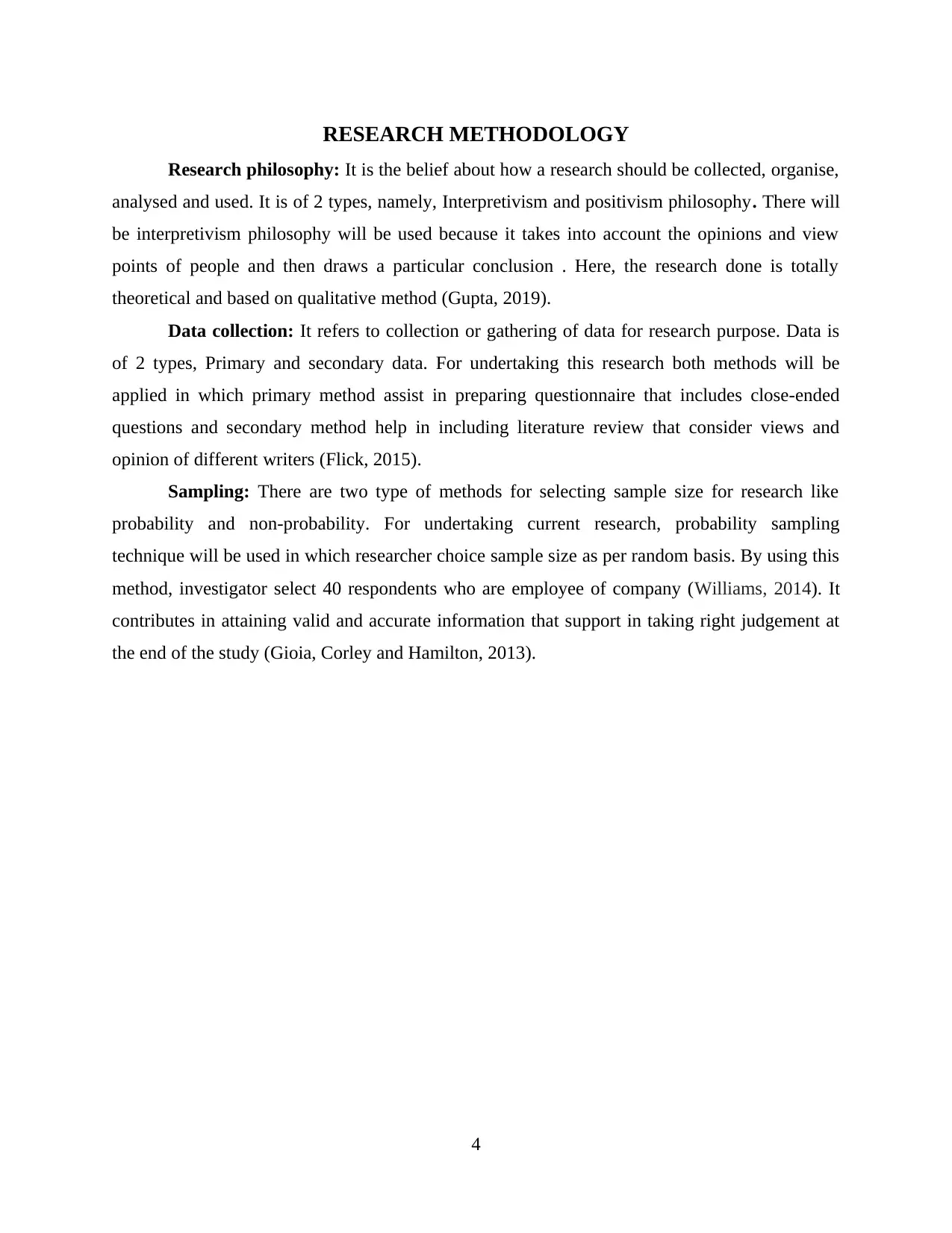
RESEARCH METHODOLOGY
Research philosophy: It is the belief about how a research should be collected, organise,
analysed and used. It is of 2 types, namely, Interpretivism and positivism philosophy. There will
be interpretivism philosophy will be used because it takes into account the opinions and view
points of people and then draws a particular conclusion . Here, the research done is totally
theoretical and based on qualitative method (Gupta, 2019).
Data collection: It refers to collection or gathering of data for research purpose. Data is
of 2 types, Primary and secondary data. For undertaking this research both methods will be
applied in which primary method assist in preparing questionnaire that includes close-ended
questions and secondary method help in including literature review that consider views and
opinion of different writers (Flick, 2015).
Sampling: There are two type of methods for selecting sample size for research like
probability and non-probability. For undertaking current research, probability sampling
technique will be used in which researcher choice sample size as per random basis. By using this
method, investigator select 40 respondents who are employee of company (Williams, 2014). It
contributes in attaining valid and accurate information that support in taking right judgement at
the end of the study (Gioia, Corley and Hamilton, 2013).
4
Research philosophy: It is the belief about how a research should be collected, organise,
analysed and used. It is of 2 types, namely, Interpretivism and positivism philosophy. There will
be interpretivism philosophy will be used because it takes into account the opinions and view
points of people and then draws a particular conclusion . Here, the research done is totally
theoretical and based on qualitative method (Gupta, 2019).
Data collection: It refers to collection or gathering of data for research purpose. Data is
of 2 types, Primary and secondary data. For undertaking this research both methods will be
applied in which primary method assist in preparing questionnaire that includes close-ended
questions and secondary method help in including literature review that consider views and
opinion of different writers (Flick, 2015).
Sampling: There are two type of methods for selecting sample size for research like
probability and non-probability. For undertaking current research, probability sampling
technique will be used in which researcher choice sample size as per random basis. By using this
method, investigator select 40 respondents who are employee of company (Williams, 2014). It
contributes in attaining valid and accurate information that support in taking right judgement at
the end of the study (Gioia, Corley and Hamilton, 2013).
4
Paraphrase This Document
Need a fresh take? Get an instant paraphrase of this document with our AI Paraphraser
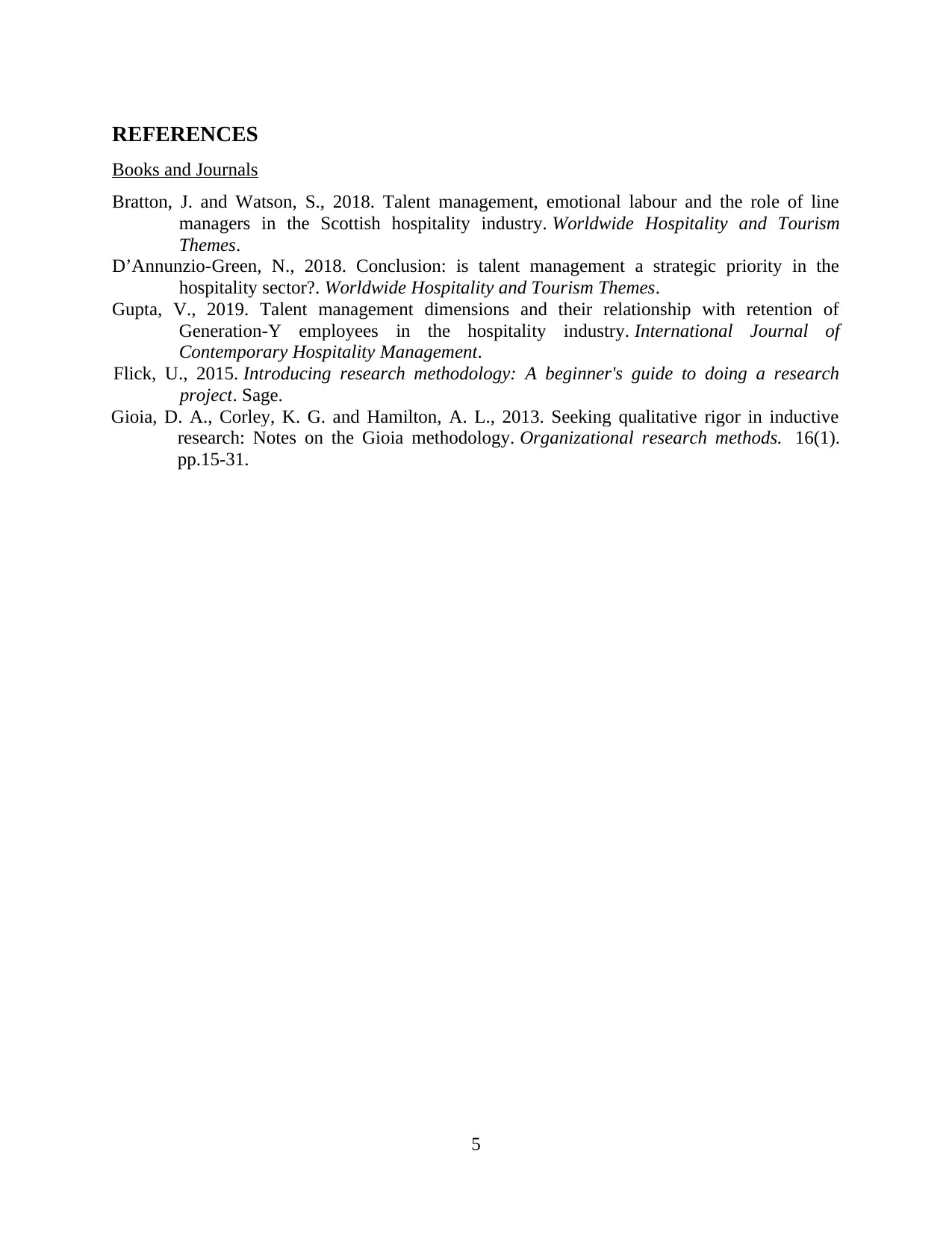
REFERENCES
Books and Journals
Bratton, J. and Watson, S., 2018. Talent management, emotional labour and the role of line
managers in the Scottish hospitality industry. Worldwide Hospitality and Tourism
Themes.
D’Annunzio-Green, N., 2018. Conclusion: is talent management a strategic priority in the
hospitality sector?. Worldwide Hospitality and Tourism Themes.
Gupta, V., 2019. Talent management dimensions and their relationship with retention of
Generation-Y employees in the hospitality industry. International Journal of
Contemporary Hospitality Management.
Flick, U., 2015. Introducing research methodology: A beginner's guide to doing a research
project. Sage.
Gioia, D. A., Corley, K. G. and Hamilton, A. L., 2013. Seeking qualitative rigor in inductive
research: Notes on the Gioia methodology. Organizational research methods. 16(1).
pp.15-31.
5
Books and Journals
Bratton, J. and Watson, S., 2018. Talent management, emotional labour and the role of line
managers in the Scottish hospitality industry. Worldwide Hospitality and Tourism
Themes.
D’Annunzio-Green, N., 2018. Conclusion: is talent management a strategic priority in the
hospitality sector?. Worldwide Hospitality and Tourism Themes.
Gupta, V., 2019. Talent management dimensions and their relationship with retention of
Generation-Y employees in the hospitality industry. International Journal of
Contemporary Hospitality Management.
Flick, U., 2015. Introducing research methodology: A beginner's guide to doing a research
project. Sage.
Gioia, D. A., Corley, K. G. and Hamilton, A. L., 2013. Seeking qualitative rigor in inductive
research: Notes on the Gioia methodology. Organizational research methods. 16(1).
pp.15-31.
5
1 out of 8
Related Documents
Your All-in-One AI-Powered Toolkit for Academic Success.
+13062052269
info@desklib.com
Available 24*7 on WhatsApp / Email
![[object Object]](/_next/static/media/star-bottom.7253800d.svg)
Unlock your academic potential
Copyright © 2020–2026 A2Z Services. All Rights Reserved. Developed and managed by ZUCOL.




